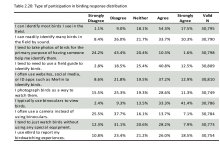
Which countries have the largest proportion of birdwatchers*?
From what I've managed to find: There's the US (around 20% of people aged 16 or more: How Popular Is Birdwatching | Birda), the UK (around 9% of the entire population: How Popular Is Birdwatching | Birda), and this source: The European market potential for birdwatching tourism | CBI, says the Netherlands and Germany come after the UK in Europe. How Popular Is Bird Watching? - Binocular Base says that birdwatching is more popular than fishing in the UK and more popular than gardening in Canada; it also claims that Sweden, Italy and Spain are, respectively, the 4th, 5th and 6th European countries where birdwatching is the most popular (but what about Belgium and France?).
Any other information?
*in a broad sense (without defining who is and who isn't a birder)
From what I've managed to find: There's the US (around 20% of people aged 16 or more: How Popular Is Birdwatching | Birda), the UK (around 9% of the entire population: How Popular Is Birdwatching | Birda), and this source: The European market potential for birdwatching tourism | CBI, says the Netherlands and Germany come after the UK in Europe. How Popular Is Bird Watching? - Binocular Base says that birdwatching is more popular than fishing in the UK and more popular than gardening in Canada; it also claims that Sweden, Italy and Spain are, respectively, the 4th, 5th and 6th European countries where birdwatching is the most popular (but what about Belgium and France?).
Any other information?
*in a broad sense (without defining who is and who isn't a birder)












